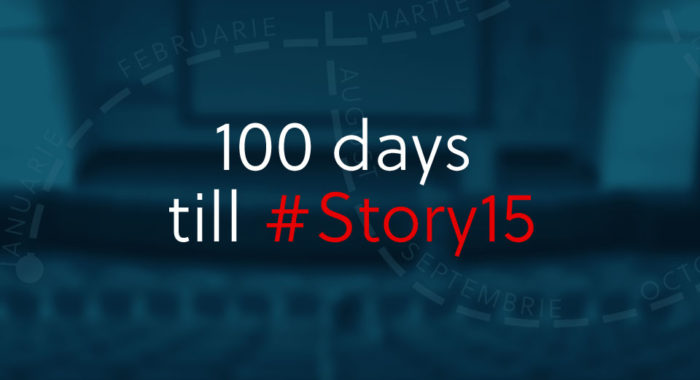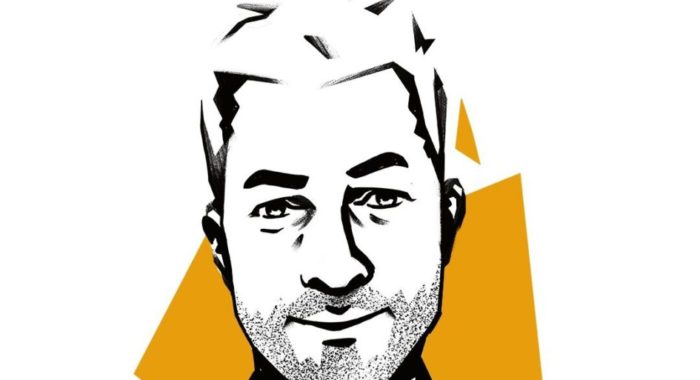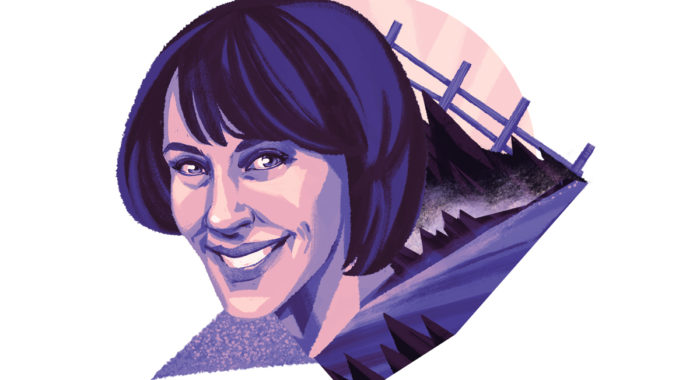Wendy MacNaughton is a San Francisco based illustrator and graphic journalist who uses drawings and words to convey human emotion. With just watercolors on a white background, she adds empathy and compassion to her process of documenting the stories of people who don’t usually get to tell them. In this interview she says: ”I love that everyone holds such incredible stories, each one of us, and you can look at a mass of people and be excited about what that group means, or you can look at each individual. I do love looking at people.”
She got an undergraduate degree in Fine Art and Advertising at the ArtCenter College of Design in Pasadena, California. As soon as she was in art school, she stopped drawing and painting, and focused on doing ”the worst contemporary art anybody has ever seen”.
She was working in advertising when she got an offer to work in Rwanda on the national campaign for the first democratic elections. When she came back, she quit her job in advertising and went to graduate school where she studied Social Work. She rediscovered drawing while commuting from Oakland to San Francisco. In this Longform podcast, she says: ”I noticed all the people sitting around on the subway and they were holding completely still. They were just like the models that I used to draw when I did figure drawing back in the day. So I started sketching them. Basically I hadn’t drawn like that in ten years. As soon as I did there was something like a muscle memory thing, it just came back, and there was also this amazing charge. I loved doing it so much!”.
She started doing it every day. She would come home at the end of the day, where she would paint her drawings, scan them, and post them on a blog. The blog attracted a global following of readers and generated enough considerable attention to allow Wendy to make a living from illustration.
Since then, she illustrated several charming books: Lost Cat: A True Story of Love, Desperation and GPS Technology by Caroline Paul, Pen & Ink: Tattoos and the Stories Behind Them by Isaac Fitzgerald, Meanwhile in San Francisco: The City in Its Own Words and The Gutsy Girl: Escapades for Your Life of Epic Adventure, her latest collaboration with her partner, Caroline Paul. Her work has appeared in publications like the New York Times, Pop-Up Magazine, GOOD Magazine, and Wall Street Journal.
Wendy says that the goal of her work is to ”take viewers out of their everyday life and context, and to get them to be able to walk into someone else’s shoes, to start to empathize with a group that is not their own”.
We collected some of the advice she gives to people who want to do creative work:
• Share your work. ”I like to work on something, finish it, and get it off my desk. And then go on to the next thing. By sharing, it’s a way of me finalizing it and learning lessons from it and going through those thoughts and then moving on to the next project.” Wendy shares all of her work online. As she explains in this interview, for her, ”showing the work is a big part of making the work”.
• Stop assuming you know the story. ”I think it’s pretty incredible what happens when we stop assuming that we know what’s going on, that we already know the story. It’s easy to come up with a solution to a creative problem when we’re talking to ourselves. But it’s probably not very interesting, unique, and it’s definitely not going to work. It’s not effective. But if we start getting curious about other people’s experiences in the world, and more than that, really listening to them, I promise you, all these totally inspiring unexpected stories will just unfold around you.” In this talk she gave at the 99U Conference, she explains how her experience at the San Francisco Library and on the corner of the 5th and 6th streets in San Francisco has changed the way she approaches her work.
• Collaborate with the right people. ”In my work, and in a lot of people’s work, we collaborate with so many people at so many levels. And we have our job where we are sitting in a little room alone, but we’re always in contact with other people. Who we work with has so much to do with the entire process, and the feeling of it, and the outcome, and quality and all that.” In this podcast, Wendy talks about the projects she gets involved in, and also about how saying no to something opens up the door to saying yes to the next thing that is going to be the right thing.
• Make mistakes. ” My drawing is often quite loose. If I were to stop my drawing every time I thought I made a mistake, I would never finish a drawing. In a sense, my best drawings are a series of fortunate mistakes. If I trust that even though something might happen that’s unexpected, I move through it, build off of it, and it takes me in a new direction that I wasn’t anticipating, and that drawing ends up becoming good.” In this interview she goes on to encourage people to make mistakes because they are part of the learning process. They also lead to unforeseen amazing results. ”I think the same thing holds true in all areas. As long as it doesn’t impact somebody else in a really negative way, the mistakes that we make end up driving us forward in really unexpected ways.”
Register here for the 6th edition of The Power of Storytelling to be charmed by Wendy once again.



